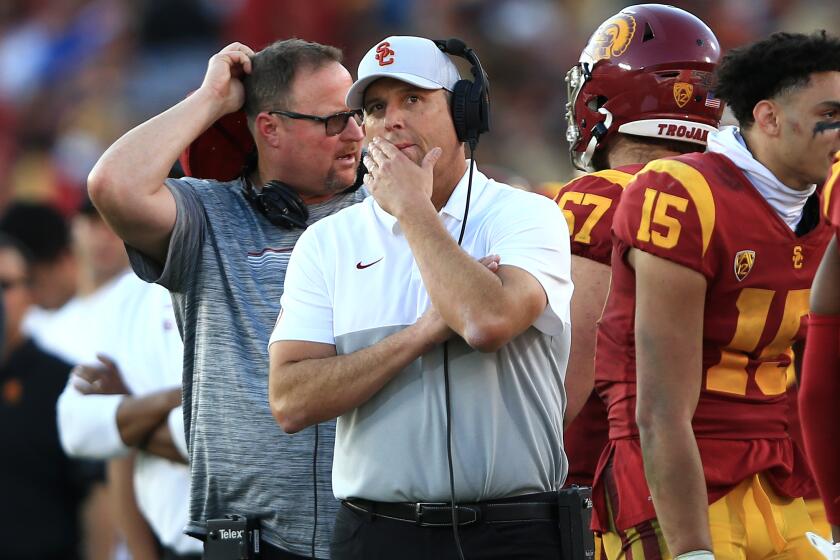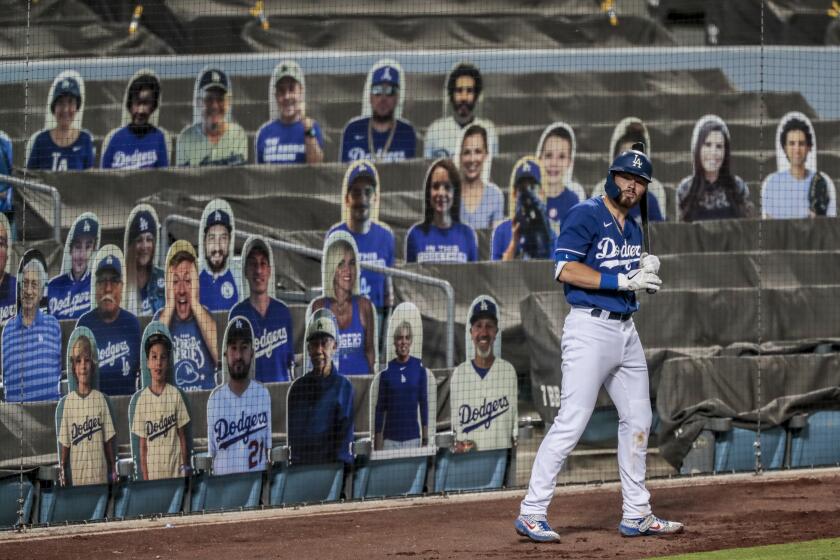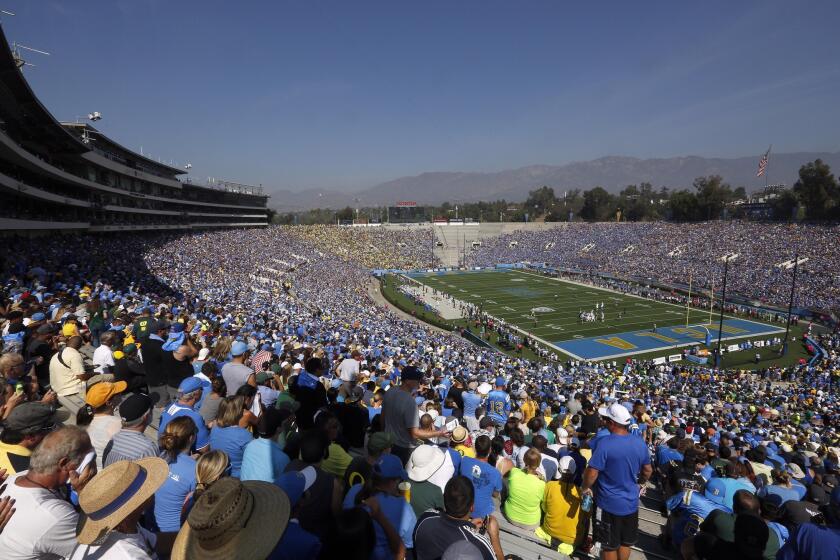Former UCLA coach Karl Dorrell had his dream home and job. Then coronavirus hit
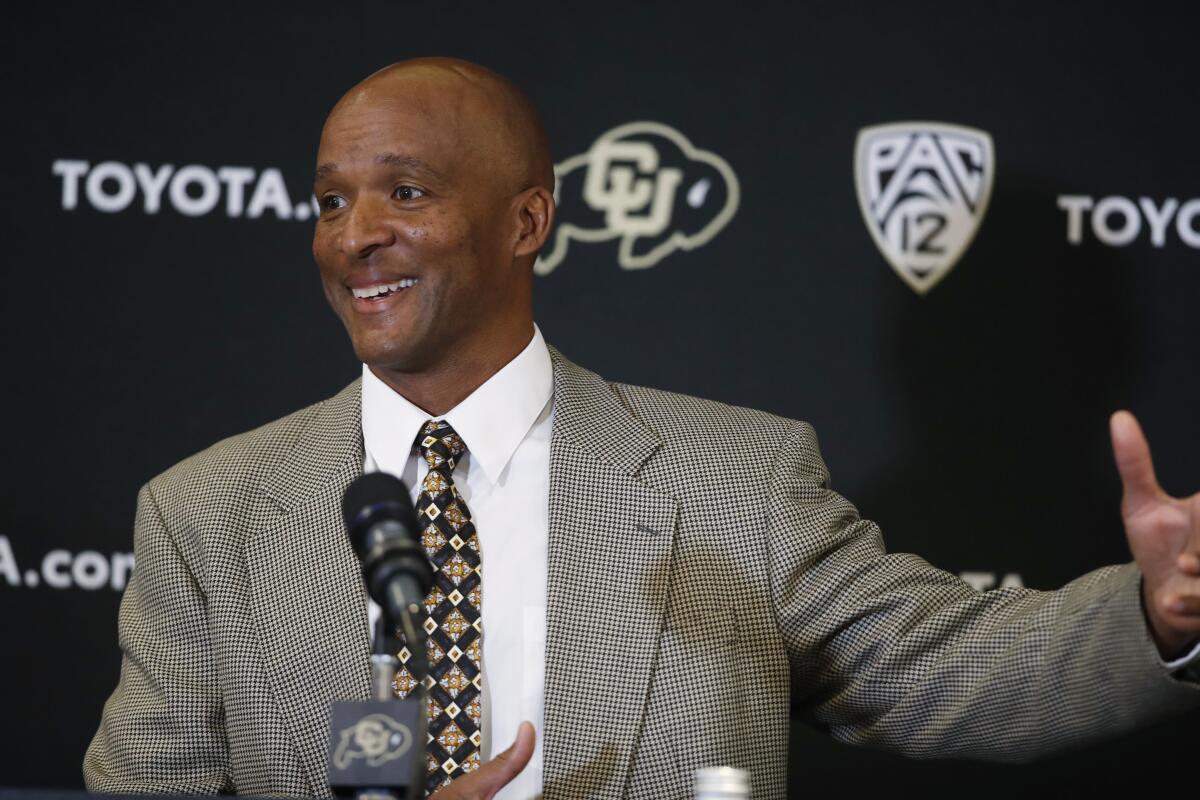
- Share via
In at least one way, Karl Dorrell’s quarantine existence is exactly as he would have imagined it:
Every day, no matter what happens, he’s with his wife, Kim, cooped up in their forever home.
A few years back, the Dorrells realized that they’d bought a dozen houses over the course of their football coaching journey but hadn’t put down any roots. Dorrell, then an assistant with the New York Jets, wanted to change that. He and Kim couldn’t get Colorado out of their heads, so they bought a half-acre lot in Lafayette, just eight miles east of Boulder, where he had been an assistant with the Buffaloes in the late 1990s.
Eventually, they got to building, and Kim would stay there whether Dorrell was in New Jersey or, last year, in South Florida with the Miami Dolphins. Now they get to really break the place in. It’s got everything he needs.
“I have modest taste,” Dorrell says. “There’s nothing extravagant that I want. It’s not a huge mansion or anything of that nature. But it’s on a big enough lot, the perfect size I can manage myself. I don’t need a riding lawn mower or anything like that.”
Especially these days, he relishes the backyard view, which offers tranquility amid constant upheaval.
After failing to keep up with most of the Pac-12 in the recruiting game, Clay Helton and his staff are adopting a different approach to lure recruits.
“It’s nothing but open space behind us,” he says. “So it feels like you’re out in the country. We see nothing but mountains and farmland.”
For as much as this home has become a linchpin of Dorrell’s life plan, it is also a big part of why everything went crazy two months ago, even before the novel coronavirus entered the picture; why Dorrell now spends his days trying to virtually connect with college football players and prospective recruits as Colorado’s new coach.
On Feb. 20, athletic director Rick George was in his second week searching for a replacement for Mel Tucker, who basically left the program high and dry in the middle of the night, leaving for a fatter contract at Michigan State a week after signing day had passed. The Buffaloes, three decades removed from winning a national championship, were about to have their third coach in three seasons.
Suddenly, that day, it hit him: “Why haven’t we talked to Karl Dorrell?” he asked.
Dorrell coached at Colorado from 1992-93 and 1995-1998, back when the program had established itself as a consistent force, back when Ralphie bounding across Folsom Field represented a show of what was to come when playing the Buffaloes. In his lone head coaching job at UCLA, he was far from a smashing success with a 35-27 record, but the Bruins did go to bowl games in each of his five seasons, and Dorrell just happened to be in Westwood during the height of Pete Carroll’s USC run.
Dorrell had been bouncing around the NFL for the last decade or so, seemingly not able to get comfortable. Plus, Dorrell’s daughter, Lauren, had just completed her junior season as a volleyball player at Colorado.
Stories examining the impact the spread of the coronavirus has had on the NBA, NHL, MLB, the NCAA tournament and the rest of the sports world.
George got his number and dialed. Dorrell was highly interested in the opening, for reasons George did not yet know. George asked when they could meet, and, as it turned out, Dorrell already was flying to Colorado the next day to spend time with Kim before going to the NFL scouting combine.
George had to do a double-take on the phone.
“I didn’t know until I interviewed him that he built his dream house in Boulder,” George says. “And knowing that, knowing that he wants to be here, I think is a strong message.”
After Tucker bolted, George needed a coach who quickly could rebuild trust with the players. Dorrell wasn’t splashy in the pool of candidates, but he was a man of character who could exude calm and, in that house, had three-dimensional proof he wasn’t going anywhere.
The specs on Dorrell’s home say quite a lot. Here was a guy who had the means to make that mansion a reality but was content to build a four-bedroom, 3,700-square-foot home and consider his basement “man cave” with a big TV and a pool table the proper amount of luxury.
Within a few days of meeting George in Boulder, Dorrell accepted the job, signing a five-year, $18-million deal.
“It was the best scenario we could have ever asked for,” Dorrell says.
The night after Dorrell officially was hired, he invited the Buffaloes’ seniors to his home for dinner with his family. He wanted to get right to work repairing the damage that had been done.
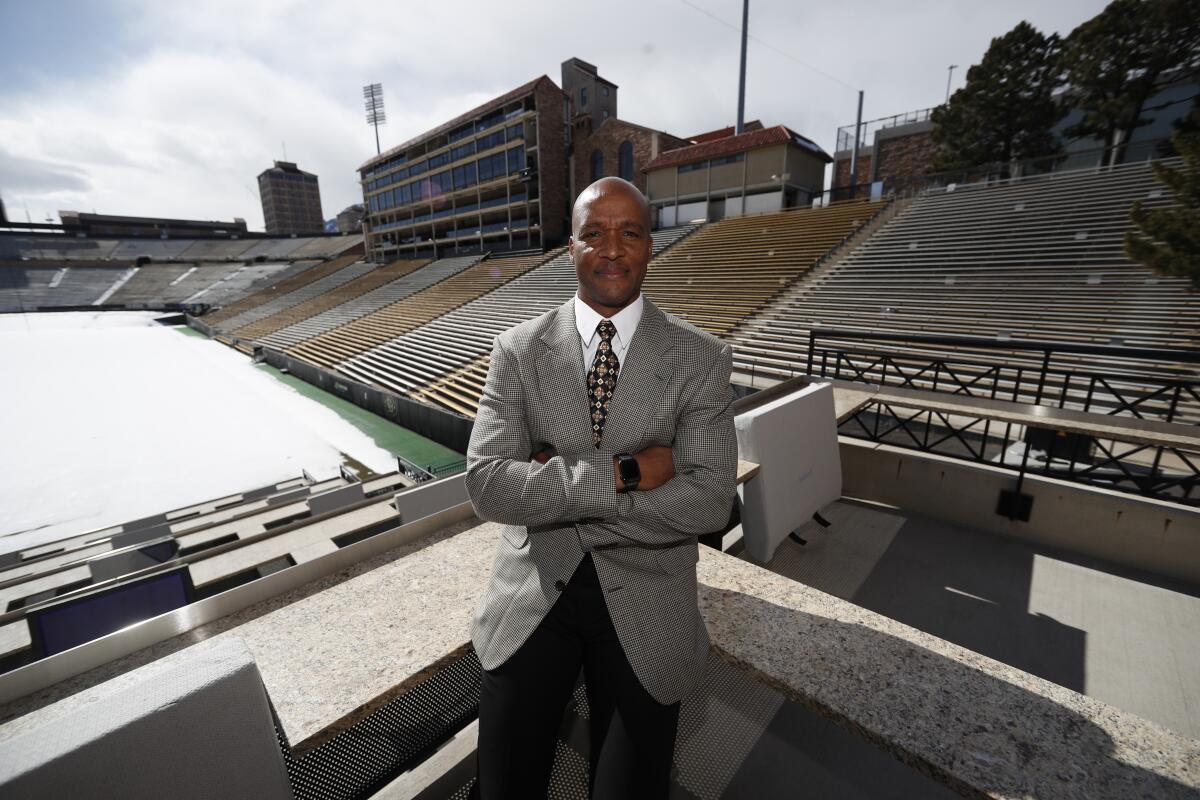
“We didn’t talk much football,” Colorado linebacker and captain Nate Landman says. “He talked about how he wanted to be there and that it was his dream job. We kind of saw another side to him as well as being a coach and it was cool to have that introduction and see where his head was at.”
Taking over a wounded program in late February was never going to be ideal. That first week, over three to four days, Dorrell staged 10-minute meetings with each player on the roster. Then, he had no idea how important those short chats would be.
Two weeks later, when sports came to a halt because of the COVID-19 pandemic and social distancing requirements, Dorrell and the team were informed that there would be no spring practice and they would not be allowed to be together as a group until further notice.
“There’s a lot of teams that are in this predicament right now; that’s the solace I’m taking from it,” Dorrell says. “It’s not like I’m the only one not being able to have this opportunity. Matter of fact, two other coaches in the Pac-12 are doing the same thing I’m doing.”
Washington’s Jimmy Lake and Washington State’s Nick Rolovich also are new head coaches during this pandemic. But Lake, who took over when Chris Petersen retired, has been with the Huskies since 2014. And Rolovich, the former Hawaii coach who replaced Mike Leach, had a six-week head start on Dorrell and has been in college football for the last 12 years while Dorrell was working in the NFL.
Dorrell could face the toughest transition period of any new coach in the nation.
But from the start, he wanted to put to use the lessons he learned at his alma mater. He believes he could not get the Bruins over the hump because he was unable to adequately replace key staff members who left for jobs in the NFL. Fittingly, given the fragility of the situation at Colorado, Dorrell was going to have to immediately nail a bunch of hires.
Dorrell had been the position coach for Darren Chiaverini during his playing career at Colorado. That familiarity led Dorrell to retain the wide receivers coach and promote him to offensive coordinator. He further created continuity by keeping defensive coordinator Tyson Summers.
Those stabilizing moves have made the spring installation of schemes, which had to be done via Zoom, less of a headache than if he had brought in new coordinators.
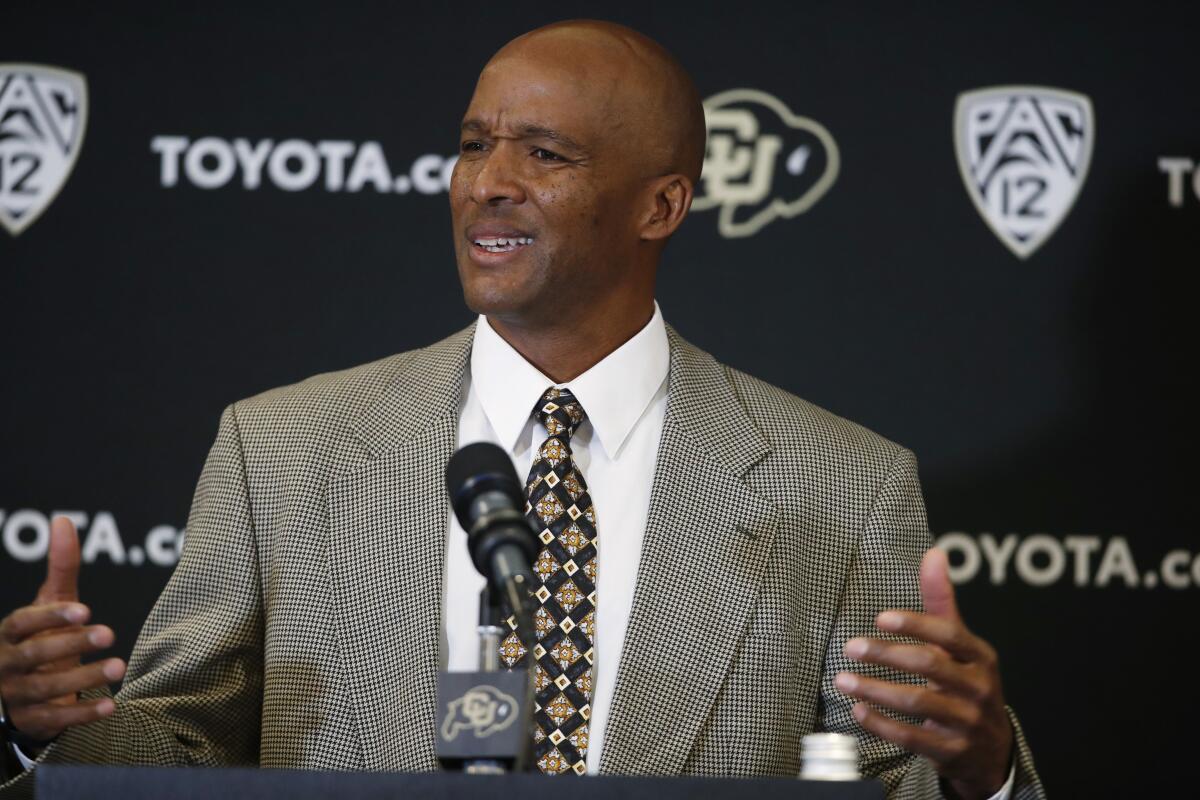
Still, as the calendar turned to May with no normalcy in sight, getting his program off the ground has been a challenge.
“From a coaching perspective, as you get information in, you want to rep it,” Dorrell says. “That’s the part we’re not able to do.
“You’re used to being in the room and you got your players, you got a grease board and you got some film and you go and attack it. You’re being demonstrative at the front of the room. What’s different now is you’re in front of a camera, and you can still do the film, you can still do the PowerPoint, but you can only do one of those things at a time.”
Dorrell often peeks into position meetings to get a feel for the players. He’ll try to randomly check in with them too. Every Friday, he holds a full team meeting to try to set the culture.
“He’s itching to be around our team,” Chiaverini says. “You can only do so much online.”
But Dorrell doesn’t dwell on it.
“We don’t talk to our players in a way that we’re in a negative situation,” he says. “It’s more, ‘This is how we’re learning for now.’ ”
For the players and coaches, there have never been so many unknowns: When will they return to campus? When can they work out together again? When can they practice? Will there be a season, and, if so, when will it start? Only the virus has the answers.
At some point, the coronavirus outbreak will subside enough to allow fans to attend football games again. The question is how many UCLA fans will make it to the Rose Bowl.
Dorrell says he does not spend much time talking about COVID-19 in his few chances to interact with the players, who through technology are exposed to as much information as he is.
“You see so many things, it’s kind of hard to know which to believe,” Landman says.
Three months ago, when Tucker occupied Dorrell’s office after a 5-7 intro season, nobody at Colorado could have foreseen any of this — Tucker’s departure, Dorrell’s arrival, the relentless pandemic of spring that stretches on toward summer. All Dorrell knew then was that he was excited to be a part of the Dolphins and to own a beautiful swath of countryside he loved in the foothills of the Rocky Mountains.
Some day, Dorrell will get to welcome more players and recruits to his dream home — and tell them more about why this is his dream job. But for now, he takes what comes each day, even having to agree to a 10% pay cut to aid the athletic budget through the pandemic.
So far, Dorrell has been the guy he was hired to be.
“Bringing in somebody that has that stability,” George says, “that has that quiet confidence in who he is and where he’s going, has been invaluable. There’s not a lot that ruffles him.”
More to Read
Go beyond the scoreboard
Get the latest on L.A.'s teams in the daily Sports Report newsletter.
You may occasionally receive promotional content from the Los Angeles Times.

